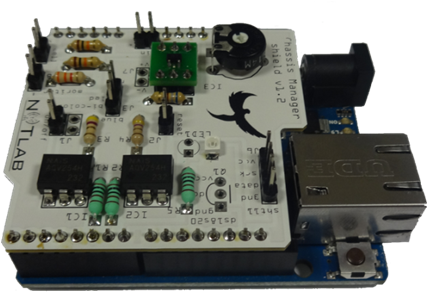
NITlab has developed powerful Wi-Fi nodes, called ICARUS, in order to support the increasing demand of state-of-the-art resources for experimentation in NITOS facility. Experimenters are able to run and evaluate demanding processing algorithms and protocols in a large scale testbed. Icarus nodes are equipped with 802.11a/b/g and 802.11a/b/g/n wireless interfaces and feature new generation intel 4-core cpu's and new generation solid state drives.



You can find in the following table, some indicative specifications for the Icarus nodes. These could be altered according to the specific needs of each deployment.
Specifications:
| Motherboard | Features two Gigabit network interfaces and supports two wireless interfaces |
| CPU | Intel® Core™ i7-2600 Processor, 8M Cache, at 3.40 GHz |
| RAM | 8G DDR3 |
| Wireless Interfaces | Atheros 802.11a/b/g & Atheros 802.11a/b/g/n (MIMO) |
| Chassis Manager card | NITlab CM card |
| Storage | Solid state drive |
| Power Supply | 350 Watt mini-ATX |
| Antennas | Multi-band 5dbi , operates both on 2.4Ghz & 5Ghz |
| Pigtails | High quality pigtails (UFL to RP-SMA) |
To control and monitor Icarus node's operation we use NITlab's Chassis Manager Card (CM card). A tiny web server is running on the CM card and serves http requests such as power on/off and reset commands. Further more, CM card can support real time sensor measures, since it can be connected with temperature & humidity sensor, as well as with a light sensor.

Three leds on the frontage are used to indicate the operational status of the Icarus nodes. More specifically the blue led indicates that the node is powered on, the red led is flashing when the cm card serves a request and the white led indicates that the node operates on running mode.

Our new node's name and logo, Icarus, are coming from Greek mythology and symbolize a human with flying skills.

